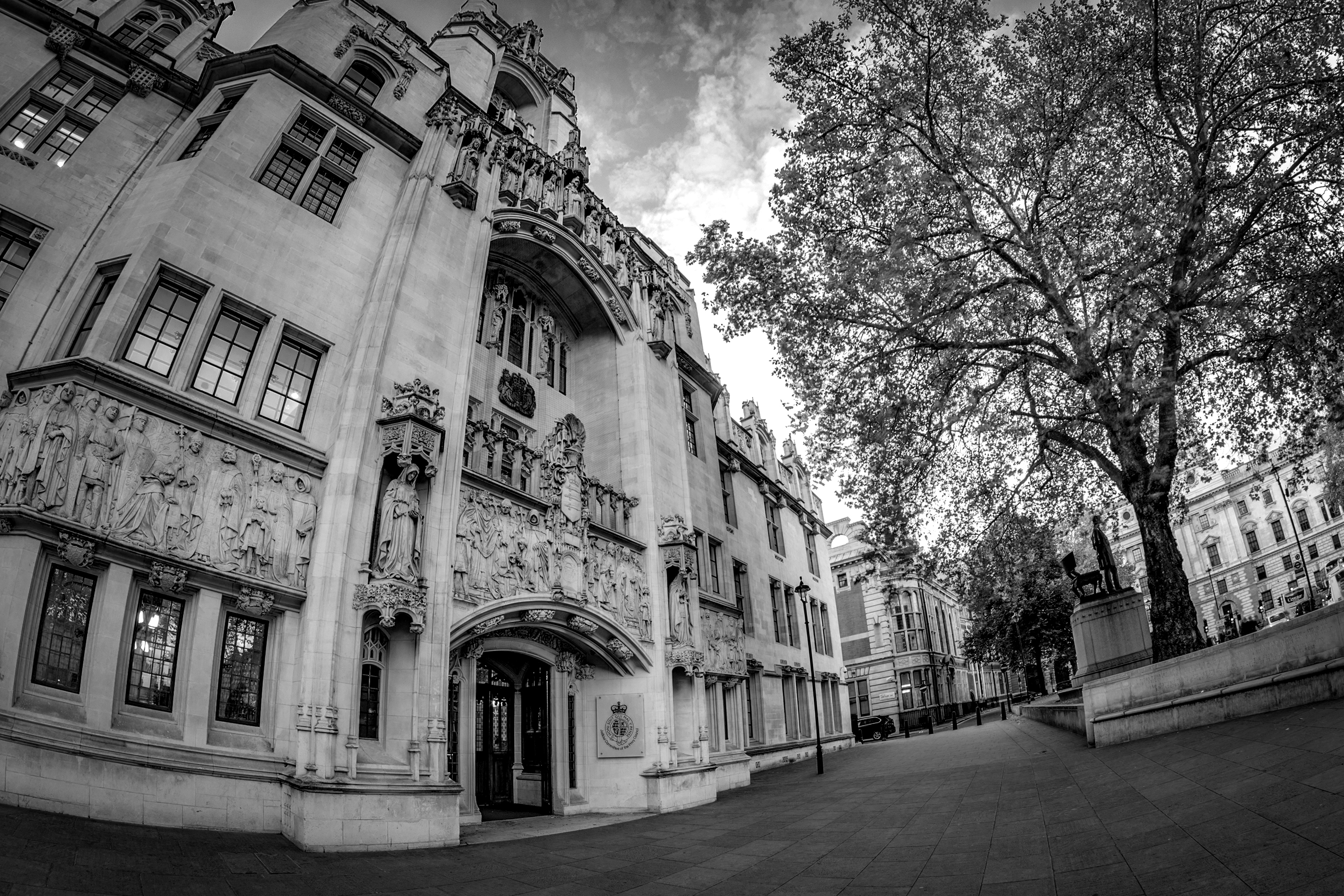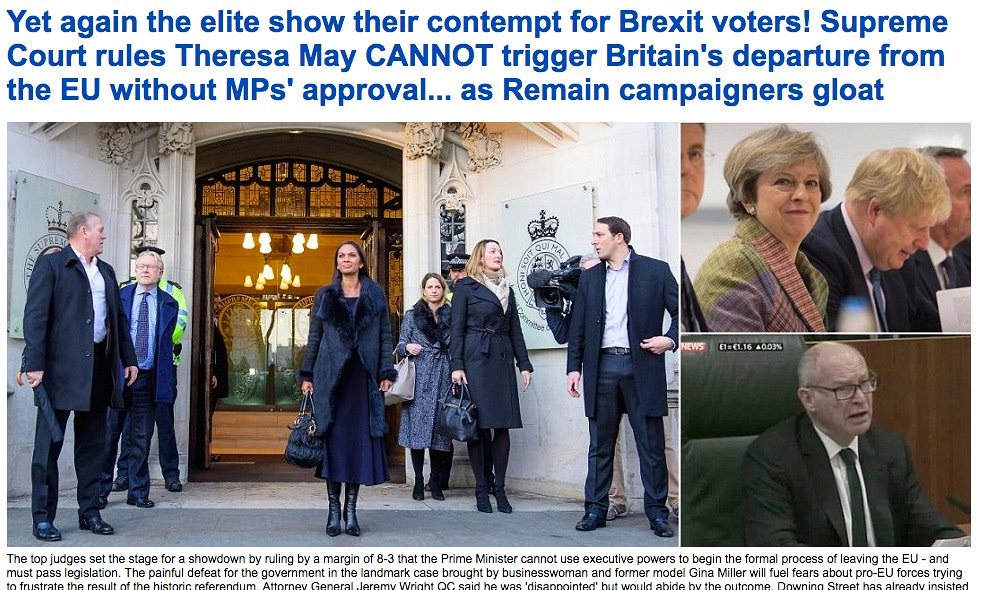Weekly Notes: legal news from ICLR – 30 January 2017
This week’s roundup of legal news and comment is all about the Law versus the Executive, with our Supreme Court upholding parliamentary sovereignty in the face of a trigger-minded executive at home and federal judges blocking executive overreach in the USA. Yes, it’s all been kicking off this week, but there’s a lovely ray of
This week’s roundup of legal news and comment is all about the Law versus the Executive, with our Supreme Court upholding parliamentary sovereignty in the face of a trigger-minded executive at home and federal judges blocking executive overreach in the USA. Yes, it’s all been kicking off this week, but there’s a lovely ray of sunshine from down under, if you can stay the distance. UPDATED 31 January 2017.
Constitutional law
Supreme Court recognises Parliamentary sovereignty
The UK Supreme Court gave its judgment on Tuesday in R (Miller) v Secretary of State for Exiting the European Union [2017] UKSC 5
By a majority of 8 to 3, the justices dismissed the government’s appeal from last year’s decision of the Queen’s Bench Divisional Court [2016] EWHC 2768 (Admin) and affirmed its decision that the triggering of article 50 (notice of intention to withdraw from the EU under article 50 of the Treaty of the European Union) cannot be done by use of the Crown’s prerogative power, but has to be authorised by an Act of Parliament.
In the devolution issues raised in the Northern Ireland cases heard together with the Miller case, the UKSC held that, the devolution Acts were passed by Parliament on the assumption that the UK would be a member of the EU, but they did not require the UK to remain a member; and the devolved legislatures did not have a veto on the UK’s decision to withdraw from the EU.
You can read the judgment here and also a convenient summary issued by the Supreme Court.
And from this page you can still link to recordings of the hearing and the summary delivered by Lord Neuberger, President of the Supreme Court, on Tuesday morning.
Reaction to the judgment
Lest the press get it into their heads to call the Supreme Court justices “enemies of the people” and so forth, and to forestall criticism of the sort she faced when that happened after the High Court judgment below, the Lord Chancellor, Liz Truss, issued a “statement following the Supreme Court judgment on Article 50“. It said
The 11 justices of the Supreme Court heard evidence over 4 days in December 2016 before handing down their judgment today (24 January 2017). The Lord Chancellor called the justices “people of integrity and impartiality”, and pledged that the government will respect the decision of the highest court in the country.
In fact they heard argument, not evidence, but we’ll let that pass from an amateur. She went on to say,
Our independent judiciary is the cornerstone of the rule of law and is vital to our constitution and our freedoms. The reputation of our judiciary is unrivalled the world over, and our Supreme Court justices are people of integrity and impartiality.
While we may not always agree with judgments, it is a fundamental part of any thriving democracy that legal process is followed. The government has been clear that it will respect the decision of the court.
Shortly after judgment was delivered, the first defendant in the case, David Davis, as Minister for Brexit, made a statement in the House of Commons, after which there was a short debate. You can watch/listen to it here, via Parliamentlive.tv from 12:33:13.
Earlier, on the radio (the Victoria Derbyshire show on BBC2) the former Work and Pensions Secretary Ian Duncan Smith made a comment on the Supreme Court decision which was almost completely wrong in every respect, according to a critique by blogger The Secret Barrister in a series of tweets collected by i-news.
When it came to press coverage, the Daily Mail (as always) led the way with a brutal headline that managed to include the word “contempt” — as though daring the Attorney General to seek its committal for contempt of court (but as a representative in the case he would be unlikely to do so):
.
For further discussion of the press coverage, see Jane Martinson in the Guardian, The Daily Mail leads the way in Brexit bile, from which the above image was taken.
For a more artistic and “motley” response, see Isobel Williams, on her Drawing from an Uncomfortable Position blog, Supreme Court: Article 50 – miserere mei, deus:
There’s an orderly press pack outside. ‘Have we got anyone bigger than Jeremy Wright?’ a television journalist asks his telephone, referring to the Attorney-General. The previous AG, Dominic Grieve QC MP, is strolling around in a nice beige coat looking pleased. Despite Radio 3 there are no tanks on Parliament Square and Big Ben has not yet struck 13 although it’s shaping up that way across the pond.
Commentary / explainers
- The Good Law project, The Gina Miller Case and Its Impacts on Brexit
- Colin Yeo, on Free Movement, Supreme Court rules Act of Parliament needed to trigger Article 50 and leave EU
- Mark Elliott, Public Law for Everyone blog, 1,000 words | The Supreme Court’s Judgment in Miller and Analysis | The Supreme Court’s Judgment in Miller
- Dominic Ruck-Keene, UK Human Rights blog, The Brexit Judgment – “The law of the realm cannot be changed but by Parliament.”
- Jim Duffy, UK Human Rights blog, Defying convention: Supreme Court puts Sewel on the sidelines
- Rosie Slowe, UK Human Rights blog, Article 50, the Supreme Court judgment in Miller and why the question of revocability still matters
- Timothy Pitt-Payne, TLS, Brexit: Not their prerogative
- Eoin O’Dell, Irish Times, Brexit ruling brings short-term clarity but long-term uncertainty
- Spinning Hugo, The Vibe of the Constitution
UPDATE – more commentary found
- Patrick O’Brien, UK Constitutional Law Assn blog: All for Want of a Metaphor: Miller and the Nature of EU Law
- Oliver Garner, UK Constitutional Law Assn blog: Conditional Primacy of EU Law: The United Kingdom Supreme Court’s Own “Solange (so long as)” Doctrine?
- Law Society Gazette, Brexit judgment: oil and water don’t mix
- Obiter J, Law and Lawyers blog, Brexit ~ Decision, Notice and the Withdrawal Bill
Legislation
European Union (Notification of Withdrawal) Bill (HC Bill 132)
The immediate and expected consequence of the Supreme Court’s decision in the Miller case was the drafting (anticipated) of a short Bill to achieve by parliamentary means the result the court said could not be achieved solely by use of the royal prerogative. It reads, in full:
A Bill to confer power on the Prime Minister to notify, under Article 50(2) of the Treaty on European Union, the United Kingdom’s intention to withdraw from the
EU.
Be it enacted by the Queen’s most Excellent Majesty, by and with the advice and consent of the Lords Spiritual and Temporal, and Commons, in this present Parliament assembled, and by the authority of the same, as follows:—
1 Power to notify withdrawal from the EU
(1) The Prime Minister may notify, under Article 50(2) of the Treaty on European Union, the United Kingdom’s intention to withdraw from the EU.
(2) This section has effect despite any provision made by or under the European Communities Act 1972 or any other enactment.
2 Short title
This Act may be cited as the European Union (Notification of Withdrawal) Act 2017.
There is commentary on the Bill from the Law and Lawyers blog by Obiter J, who notes, inter alia, that: “The Bill is concerned with Notification to the EU and NOT with the DECISION to withdraw.”
There is also an Explanatory Note.
The Bill was introduced to the House of Commons and given its First Reading on Thursday 26 January 2017. The Bill is expected to have its Second Reading debate on Tuesday 31 January 2017 with conclusion of Second Reading on Wednesday 1 February 2017.
The Bill has already been subject to a number of proposed amendments. Earlier in the week it was reported by i-news that the SNP had vowed to make 50 amendments but there’s no sign of them having tabled them yet, in addition to those already listed.
Diplomacy
State visits by Prime Minister
 Theresa May paid court last week to two world leaders with tarnished human rights reputations. First she went to the United States and made a speech to the Republican Party Congress in Philadelphia in which she reasserted the “special relationship” often said to exist between Britain and America, and then went to Washington where she met with newly inaugurated President Trump, ostensibly to promote a trade deal.
Theresa May paid court last week to two world leaders with tarnished human rights reputations. First she went to the United States and made a speech to the Republican Party Congress in Philadelphia in which she reasserted the “special relationship” often said to exist between Britain and America, and then went to Washington where she met with newly inaugurated President Trump, ostensibly to promote a trade deal.
Read Mrs May’s speech (via Spectator).
Read the press conference remarks (as published by the US Embassy to the UK).
Their meeting was said to have been cordial, and images of the two of them holding hands were widely construed as signifying a cosier relationship than many thought wise (though the official spin was that Trump has a phobia about downward inclines and they were at the time negotiating a short downward ramp with no handrail).
May followed this with a trip to Turkey to meet with President Erdogan, whose human rights record, especially after the savage clampdown on any opposition in the wake of last summer’s failed coup, is much worse than Trump’s (though Trump seems to be doing his best to catch up). Again, the stated purpose of the Turkey trip was to promote a trade deal – something only necessitated by a Brexit vote which was fuelled in part by Leavers’ misrepresentations about the likelihood of Turkey joining the EU sooner rather than (increasingly) later.
In fact the trade deal was to sell arms to Turkey, which is justifiable on the basis that Turkey is a member of Nato, and Mrs May did apparently raise the question of human rights with President Erdogan, as urged in an open letter signed by Kirsty Brimelow QC, chair of the Bar Human Rights Committee (BHRC), and Andrew Langdon QC, chair of the bar in England, according to the Guardian.
Torture
Trump’s support for torture threatens intelligence sharing
The widely reported statement by newly inaugurated US President Trump of his belief that “torture works” and that the US military should be allowed to use waterboarding and other banned methods has caused a number of difficulties. It would present the UK intelligence services, who work closely with US counterparts, with a major dilemma if the US were to resume such interrogation methods, according to the Guardian.
UK agencies such as GCHQ and MI6 would not want to lose the benefit of US intelligence sharing but could find themselves in breach of international law if they used any information obtained via torture.
See also: David Anderson Q.C. Independent Reviewer of Terrorism Legislation, Torture and Intelligence Cooperation.
However, at a press conference during Theresa May’s visit last week, in response to a question from a British journalist, Trump said he would leave the decision on whether or not to use it to his Defence Secretary, Gen James Mattis whom he described as a “general’s general”.
“He has stated publicly that he does not necessarily believe in torture or waterboarding, or however you want to define it… I don’t necessarily agree,” said Mr Trump, according to the Independent.
So on this occasion it looks as though Trump was more about the bark than the bite.
Nevertheless, his statements have caused consternation and distress among those affected by torture, which is still widely used by oppressive regimes, as noted by Freedom from Torture.
Their campaign in this country has featured the decision of the UK Supreme Court earlier this month in Belhaj v Straw [2017] UKSC 3, in which the Libyan politician and military leader, Abdul-Hakim Belhaj was given the green light to bring proceedings against Jack Straw as the former Foreign Secretary, the former head of MI6 and the UK government itself for their involvement in his unlawful rendition to Libya and torture during the so-called “war on terror”. The Supreme Court rejected arguments by the defendants that Mr Belhaj’s civil claim should be barred by the principle of state immunity, protecting states from being sued in the courts of other states, and the “foreign act of state” doctrine, which bars scrutiny by UK courts of acts committed by another state on its territory.
Support Freedom from Torture, who help victims and promote a ban.
Law (and injustice) from around the world
America
Law trumps executive overreach
Following his disputably well attended inauguration the weekend before, President Trump spent last week signing a series of Executive Orders, making good on a number of his more shouty campaign pledges.
One of them was to set in motion the matter of building a vast wall along the Mexican border, ostensibly to prevent ingress by migrants. Construction of the wall will cost billions of dollars – money that Congress will eventually need to approve. Trump said that Mexico would be made to pay for it. Mexico has refused to do so. It was later explained by someone from the Trump administration that the money could come from charging a tariff on imports of Mexican goods, so Mexican goods would simply cost more to American consumers, who would actually be the ones paying for the wall, though the indirect consequence might be to damage the Mexican economy by reducing demand for its exports. (Surely, though, this makes a perfect opportunity for a state visit to Mexico by Mrs May to drum up another splendid trade deal?)
But the executive order that has really shaken the credibility even of some of Trump’s most vociferous supporters was conveniently (not least for her) saved until after Mrs May had gone to Turkey. This was an order, issued on Friday, banning the entry into the United States of all Syrian refugees for an indefinite period, of all other refugees for the next 120 days, and of travellers who have nationality or dual nationality of Iran, Iraq, Libya, Somalia, Sudan, Syria and Yemen for the next 90 days.
The order caused immediate chaos at airports as those previously permitted to travel were prevented from entering, even those with green cards (thus already qualified as residents of the USA) and some quite prominent persons, such as the Olympic gold medallists Sir Mo Farah (originally Somalian, now British) who apparently lives with his family in Oregon. Trump denied the ban was essentially a Muslim ban, but that was how it has been taken.
The immediate response was twofold. Massive protests at many airports by opponents of the policy and of Trump generally. And a mass migration of lawyers to said airports to assist pro bono in the challenge of the legality of the detention and threatened deportation of those affected by the ban.
Acting in response to submissions by lawyers for the American Civil Liberties Union (ACLU), Judge Ann M. Donnelly of Federal District Court in Brooklyn, New York issued an injunction preventing the deportation of anyone who had arrived in the United States with valid visas or refugee status. Judges in other states made similar orders thereafter, including District Judge Leonie M. Brinkema of the Federal District Court in Virginia, who issued a temporary restraining order for a week to block the removal of any green card holders being detained at Dulles International Airport. But there were reports of officials at Dulles refusing to let lawyers talk with detainees, even after being shown Judge Brinkema’s order requiring such access.
Meanwhile in the UK a parliamentary petition was launched, urging the government to postpone any official state visit by President Trump on the basis of the “vulgarity and mysogyny” and the embarrassment it would cause Her Majesty the Queen, though a better reason might be his lack of respect for international norms of human rights. At the time of writing, the petition had topped the million mark.
Further reading:
- BBC: Trump executive order: White House stands firm over travel ban
- New York Times, Judge Blocks Trump Order on Refugees Amid Chaos and Outcry Worldwide
- Reuters, U.S. judges limit Trump immigration order; some officials ignore rulings
- Atlantic, Courts Stay Trump’s Order Targeting Muslims, but Confusion Reigns
- Steve Vladeck on the Just Security blog, The Airport Cases: What Happened, and What’s Next? (includes a handy summary of all the executive orders and the fallout therefrom).
UPDATE – Executive trumps law?
On Monday 30 January the acting Attorney General Sally Yates, an appointee of former President Obama’s, who continued to serve (at Pres Trump’s request) pending the approval of his own nominee Jeff Sessions, instructed Justice Department staff not to defend the travel ban in court because she didn’t think it was legal. Later the same day, Trump fired her, replacing her with another, more compliant temporary nominee. The White House said in a statement Yates was removed for “refusing to enforce a legal order designed to protect the citizens of the United States.” Source: Bloomberg news.
Australia
First female chief justice sworn in
Susan Kiefel, Australia’s first female Chief Justice of the High Court has been sworn in at a ceremony in Canberra, using her speech to reflect on how historic the occasion is for women in law, reports ABC News.
Chief Justice Kiefel left school at 15, completing her high school studies part-time while working as a legal secretary. She studied law part-time before being admitted to the Queensland Bar in 1975. In 1987 she became the first woman in Queensland to be appointed Queen’s Counsel.
Chief Justice Kiefel has sat on the High Court bench since September 2007, having already served as a judge in the Federal Court and the Supreme Court of Queensland.
She replaces Robert French as Chief Justice, who has finished his term on the High Court bench after reaching the mandatory retirement age of 70.
There is a detailed interview of former Chief Justice French about his long and varied career, by Damien Carrick on the excellent Law Report podcast. Let’s hope he gets round to interviewing Chief Justice Kiefel soon, and doesn’t leave it till she retires. (Though perhaps they can be more frank then.)
And finally: Tweet of the Week…
needs no explanation.

That’s it for now. Our thanks to all who flagged up stories, via their blogs (which we always try to acknowledge) and via Twitter (where useful tweets are retweeted).
This post was written by Paul Magrath, Head of Product Development and Online Content at ICLR, who also tweets as @maggotlaw. It does not necessarily represent the opinions of ICLR as an organisation. Comments welcome on Twitter @TheICLR.
Sign up now for weekly email alerts from this blog. Just put your email address into the box on the left.

